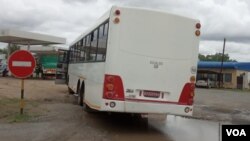Botswana has repatriated 135 Zimbabwean refugees, the majority who fled political persecution at the height of a violent and deadly 2008 presidential election. Some of the 700 refugees still remain in camp, reluctant to return home, citing fears of political persecution.
The refugees feel they are caught between a rock and hard place.
The Botswana government gave the refugees an ultimatum: Register for voluntary repatriation by Dec. 31, or face forced removals.
The refugees told the United Nations High Commission on Refugees (UNHCR) that conditions in Zimbabwe were not conducive for their safe return.
The UNHCR then offered the migrants $300 per person, food rations for three months and transport to the Zimbabwe border.
A 55-year-old returnee, who preferred anonymity for fear of victimization, says she and her cohorts now face a bleak future. Her homeland is in the middle of one of its worst economic crisis.
"I can go there (to Zimbabwe) but I don't have a home, I don't have money to eat, or to let my children to go to school. There is no water, no electricity and no food. It was better when we were this side, we were given everything, we were eating."
While some of the refugees are already planning a new life after years away from home, others like Bekimpilo Weza are not prepared to return.
An opposition supporter, Weza, who fled Zimbabwe in the aftermath of the bloody 2008 election, said it is not the right time to go home.
"People might think that Zimbabwe, maybe, after the change of government, it has changed,” Weza said. ”But the government that is ruling is still the same government, ZANU-PF. The system is still the same. So there is no change. "
Wasu Chibi, a staunch supporter of the opposition MDC party, feels the host government has let the refugees down by repatriating them.
Chibi said they will rather wait for forced removals.
"Botswana as a country is saying Zimbabwe is a free and safe zone,” Chibi said. “This is contrary to the Geneva Convention of 1951, whereby there should be an agreement with all the stakeholders in Zimbabwe. We are saying let it be clear with Botswana and UNHCR that there has been no cessation clause declared yet on Zimbabwe, and they are busy putting people's lives at risk."
The two countries' governments said they are satisfied the situation in Zimbabwe is conducive for the refugees' safe return.
The UNHCR has, in recent years, scaled down financial support to host governments.
This has triggered an increase in the repatriation of refugees. Nearly 800 Namibian refugees were recently deported from Botswana.
The country now hosts fewer than 2,000 refugees, from several countries across Africa.




